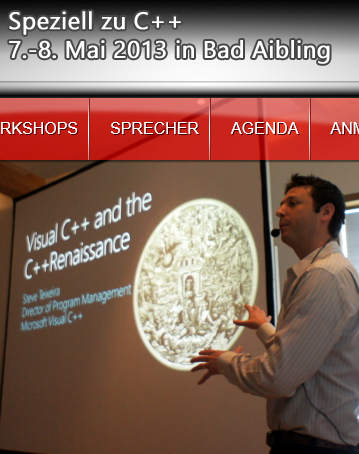Advanced Developer Conference C++
Advanced Developers C++ 2013
May 7-8, 2013
Bad Aibling, Germany
Sessions are presented in either English or German. While the conference has many Windows-focused topics, a number of the sessions are of general interest to C++ developers.
Here are highlights from the Sessions page:
Trends and Future of C++ Standard and ISOCPP.org
Transactional Memory in C++
Michael Wong, IBM, and subgroup chair of ISO C++ SG5 (Transactional Memory)Keynote: Building Modern Device Apps with C++
Building and Consuming Cloud Services with C++
Steve Teixeira, MicrosoftWarum wird Code so wie er ist? [Why does code get the way it does?]
Holger Kolb, DEVCOLEinfacheres C++ mit C++11 [Simpler C++ with C++11]
Peter Sommerlad, FHO HSR Hochschule für TechnikSicher sein oder sicher fühlen? -- Sicheren C++ Code schreiben [Be secure or feel secure? -- Writing secure C++ code]
Oliver Niehus, MicrosoftPerformance-Optimierung für parallelen C++ Code auf Windows [Performance optimizing parallel C++ code on Windows]
Programmieren und Optimieren auf Xeon Phi [Programming and Optimizing for Xeon Phi]
Michael Steyer, Intel











